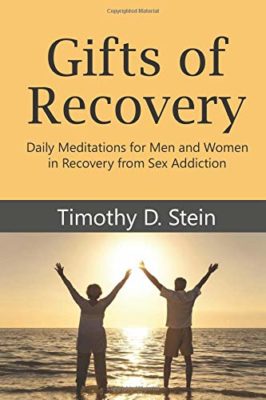By Tim Stein, MFT
Meditation from Gifts of Recovery
Just because it is OK for others does not mean it is OK for you.
– therapy lesson
Everyone is different. What we need for balance and sobriety may be different than what someone else needs. This is true for us when we compare our sobriety and recovery boundaries to other addicts. This is especially true when we, as addicts, compare ourselves to someone who is not an addict. What may be normal, acceptable, and even healthy for a non‑addict can be a death knell for someone with an addiction. More than one of us has found ourselves in relapse and saying, “They let themselves do this behavior and I thought that sounded like a good idea for me.” We must each take responsibility for realizing and respecting our own boundaries.
Am I finding effective boundaries for myself or am I copying the boundaries of others? What can others do that simply does not work for me? What gifts await me as I choose my boundaries based on what I need and not what others can do?
As addiction therapists, we are continually helping our clients explore their addictive urges, educating about addictive patterns, and guiding our clients into recovery. We have become well-versed in the landscape of addiction.
As therapists in our own recovery, we must remember that while we are guiding others we are also walking a recovery path through our own addiction landscape. Tenzing Norgay, the Sherpa who helped Sir Edmund Hillary reach the top of Mt. Everest, also climbed the mountain to its peak – facing the same perils and challenges as the man he was guiding. Regardless of our addiction expertise, it is important for us to acknowledge the dangers of our addiction while we are guiding others. Here are some tips for accomplishing this:
- We need a program. This may not be the program we would prescribe for a client in the throes of addiction. This may not be the program we would prescribe for a client one year into sobriety who struggles with recovery. Nonetheless, we need a program. It is a mistake to confuse an increased resilience to our addictive triggers and a wealth of knowledge regarding addiction with not needing a program. Instead of asking whether we need a program, it is better to ask what type of program we currently need in our recovery.
- Our program will vary. Early in recovery, having a strict and rigid program is necessary to gain and maintain traction in sobriety. With time, consistent sobriety becomes easier and we do not need the same strict and rigid program as before. However, there will be times when we are more susceptible to our addiction, and it is important to adjust our program accordingly. If we do not recognize when our addiction is creeping up on us and if we fail to bolster our program at these times, we are asking for trouble.
- Our program should remain constant. There will be aspects of our program we adjust. However, it is important for us to recognize the important parts of our program that must remain consistent. I may not attend as many meetings as previously, but I continue to attend sobriety and recovery meetings consistently. I may not call everyone in my support community, but I have at least two or three people I call consistently. My recovery routine may not be as robust as it was in the past, but I do have a consistent recovery routine. Acknowledging that our program will vary over time does not mean we do not maintain a consistent program.
- We must keep our denial in check. While the voice of our addict loses volume and consistency over time, it never completely goes away. (At least that has been my experience. I will gladly let you know when that changes, but you should not expect to hear from me on this matter anytime soon.) No matter what our addict voice tells us, we must remember that we will never be cured. No matter how much of an expert we are, we must still focus on and follow the basics of a successful program. When life feels normal, we should appreciate it but not expect that to last indefinitely; instead, we must prepare for the next challenge. We will always need others to support us and hold us accountable because no matter how wrong we are, we typically do not disagree with ourselves. Whatever form our denial takes, we need to be aware of it and keep it in check.
As wounded healers, our expertise and daily exposure to recovery programs can be a benefit. This can also lull us into complacency. It is important for us to continually acknowledge and maintain what we need to stay sober and continue our recovery.

